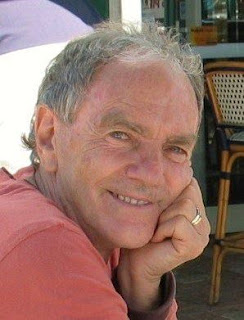The Bible's Age and Death.
 |
| Gustaw Herling-Grudziński |
"The Bible's age and death" is a book, or rather a sketch for the book, written when Herling-Grudzinski was already in his 80s. It tells the story of Italian Matusalem - Bartolomeo Spada - who was believed to achieve the age of over 130. Because of his physical strength and sexual prowess (he possibly suffered from priapism), Spada had become a darling of the fascist system in Italy.
 |
| Benito Mussolini on a beach |
The only problem for Spada was that, in spite of having a few "wives," he didn't have any children. Reportedly, when he was almost 130, one of his wives became pregnant. However, she later miscarried of what appeared to be two undeveloped fetuses. Spada, Herling-Grudziński writes, had become quite depressed at that time. He kicked his wife out, started to neglect his house and his field, drinking himself to sleep every night.
At this point, the story goes, Spada started praying for death, and even asked a local priest to pray for his death, which the priest refused to do. Spada also became sick, possibly of prostate cancer, and suffered from tremendous pain. This is when he concluded it "would be terrible if a man couldn't die."
Yes, I believe, this is how it works. People talk about a long life, even Physical Immortality (see one of my previous posts - On the Death of the Immortal) only when they are reasonably healthy. Suffering from pain, to which there is no solution, changes the outlook dramatically.
In Spada's case, Herling-Grudziński narrates, a solution was found. The fascist system was very much interested in his continued existence. On the directive from Mussolini, Spada was taken to the best clinic in Italy, was given access to the famous healing facilities. Also, a Catholic priest, known for both making miracles and somewhat unethical life-style, worked on him. In the end Spada was brought back to health. It was good enough to allow him to become a commander of a fascist's youth division. This all in spite of being a half-Jew.
It was not quite clear how Spada died, Herling-Grudziński writes. Reportedly, no locals wanted to talk about him and none wanted to work his fields. It looked like the person and his possession were considered "cursed." It is also not quite clear how Herling-Grudziński intended to develop or finish this story. He died before finishing this work.
It appears that what attracted Herling-Grudziński to this story, and the conclusion toward he was heading, was that long-life, so desired by many, can be more a curse than God's given privilege. This reminds me of my high-school teacher, prof. Adamus, who, then in his 80s, also concluded that he was cursed. He used to quote a Latin saying - "whom the gods love die young." He didn't seem to be afraid of the "black cloud."
In a sense we are all in the process of dying all the time. Not a big deal. Herling-Grudziński quotes in his book a poet, Salvatore di Giacomo, who once asked an old priest, Maddaloni, how he was. The priest responded:
"Non lo vedi? Sto morendo." ("Don't you see? I am dying.")
(PR)


Comments
Post a Comment